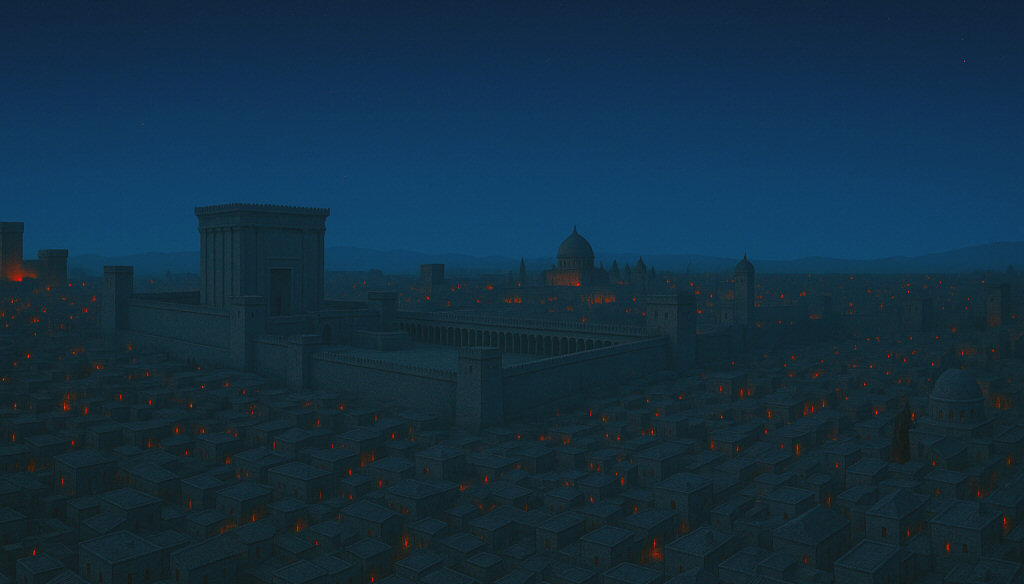Zechariah is one of the most difficult books in the Bible. This is especially true in chapter 14, verses 6-7. You only need to compare translations to see this. Here are some for verse 6: “On that day there shall be no light, cold, or frost” (ESV), “On that day there will be no light; the luminaries will die out” (NASB), “And it shall come to pass in that day, that the light shall not be clear, nor dark” (KJV).
Before we attempt to decipher that mess, we’ll look at the verse that follows it, “And there shall be a unique day, which is known to the LORD, neither day nor night, but at evening time there shall be light” (Zechariah 14:7 ESV). Neither day nor night is a good way to describe dusk or dawn, an in between state or transitional phase. But what about “At the evening time there shall be light”? Well, when it’s evening time here, it’s morning somewhere else in the world. The end of my day is the beginning of another’s.
Biblically, there was a transitional period when one thing ended as the other was beginning. It was the transition of the old covenant to the new. We see cryptic language regarding this event from Isaiah as well:
Before she was in labor she gave birth; before her pain came upon her she delivered a son. Who has heard such a thing? Who has seen such things? Shall a land be born in one day? Shall a nation be brought forth in one moment? (Isaiah 66:7-8 ESV)
I believe this is describing the transition of the earthly Jerusalem (the old covenant) to the new Jerusalem (the new covenant) because of a verse that follows. “Rejoice with Jerusalem, and be glad for her, all you who love her; rejoice with her in joy, all you who mourn over her” (Isaiah 66:10 ESV). Isaiah’s paradox—mourning with her yet rejoicing over her—captures a turning point where one covenantal identity passes away even as a new one emerges.
Regarding this transition, the author of Hebrews tells us that the holy places in heaven were not opened to us until the earthly temple was destroyed. “By this the Holy Spirit indicates that the way into the holy places is not yet opened as long as the first section is still standing (which is symbolic for the present age)” (Hebrews 9:8-9 ESV). The present age being the Mosaic order. Like the mystical bird, Phoenix, the new Jerusalem rose out of the ashes of the earthly Jerusalem. This fits with both the transitional period in Zechariah and the cryptic language in Isaiah.
Now let’s go back to verse six. Oddly, only two translations make use of the Hebrew word yaqar in this verse (some work from a textual variant), which means precious, valuable, rare or esteemed. However, when we include that word and place it all in the context of the dawning of the new covenant age, something stunning appears. “And it has come to pass in that day, the precious light is not, it is dense darkness” (Zechariah 14:6 LSV).
For one moment—not in time but in the world—the precious light of Jesus was no longer there. It was a time of dense darkness. “Now from the sixth hour there was darkness over all the land until the ninth hour” (Matthew 27:45 ESV). Jesus is central to this transitional period. The crucifixion darkness exemplifies the extinguishing of the precious light, functioning as the covenantal turning point that Zechariah compresses into the imagery of “a unique day”.
All of this fits the theme given to us at the end of the previous chapter. “Strike the shepherd, and the sheep will be scattered” (Zechariah 13:7 ESV). We know the scene. Shortly after Jesus quoted this verse, He was arrested and the disciples all fled in fear. I believe these difficult verses in Zechariah point to Jesus who came to bring the blood of the new covenant. In doing so, He changed everything.
